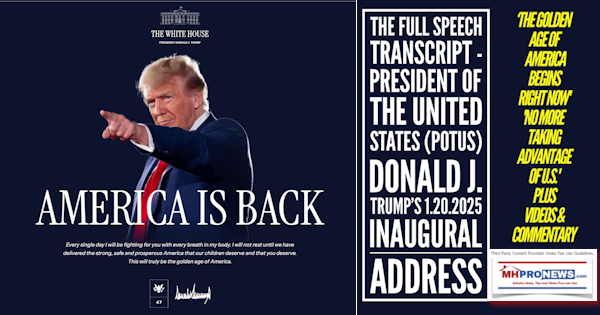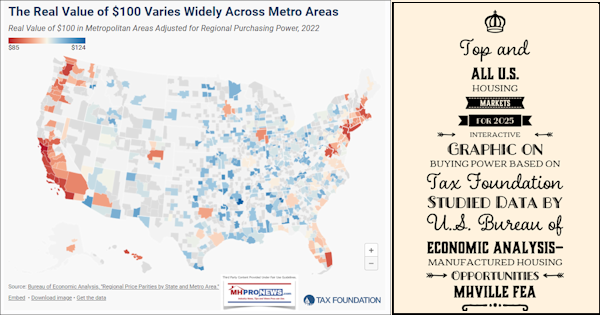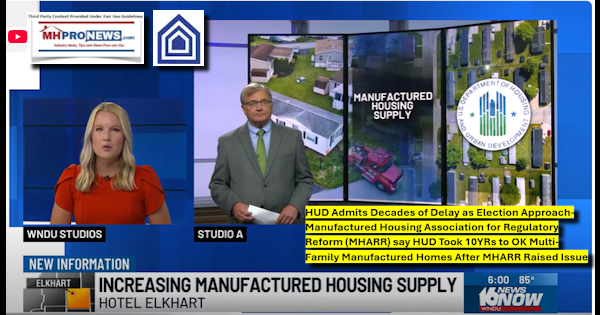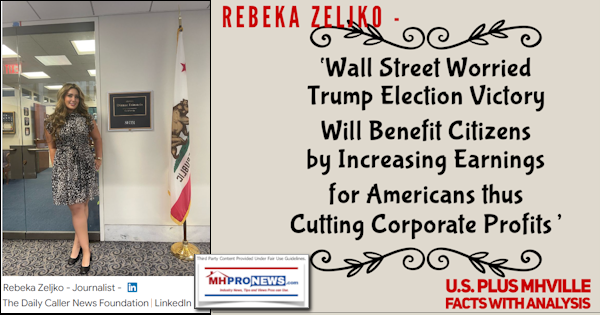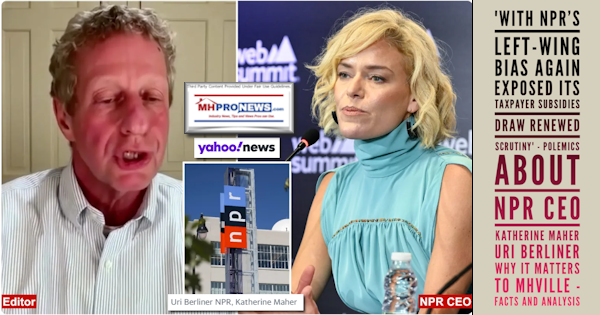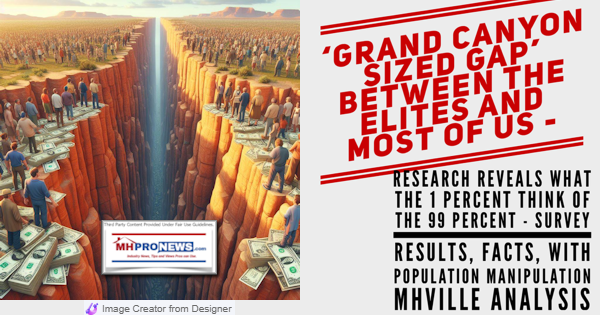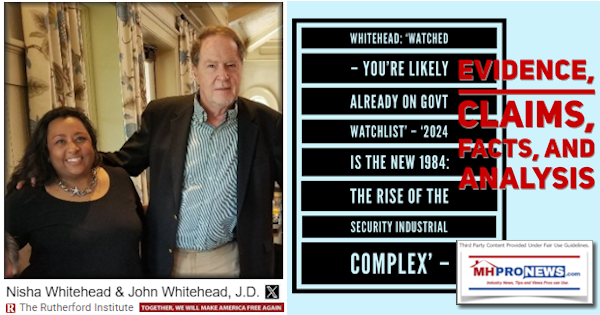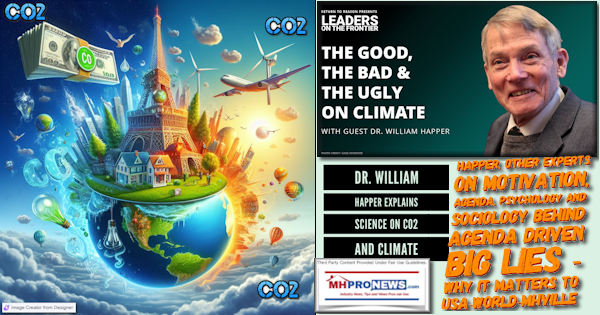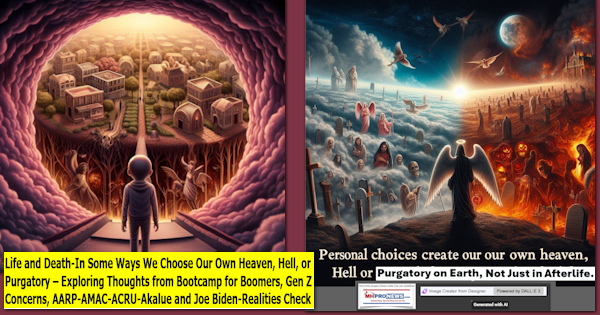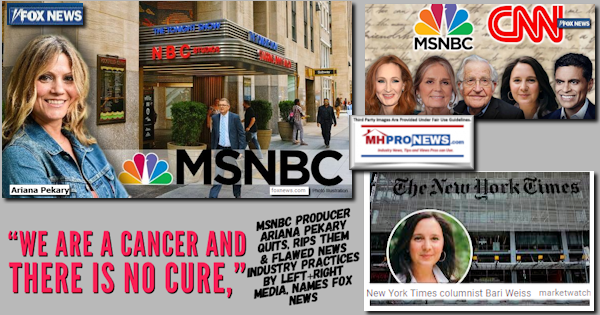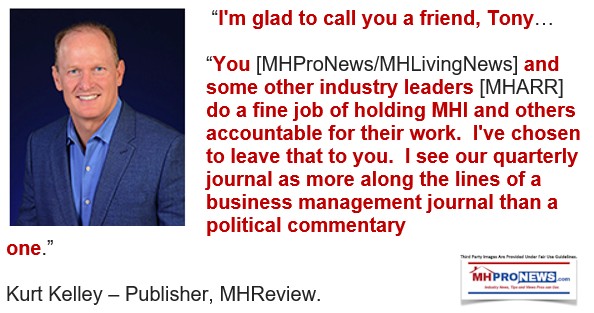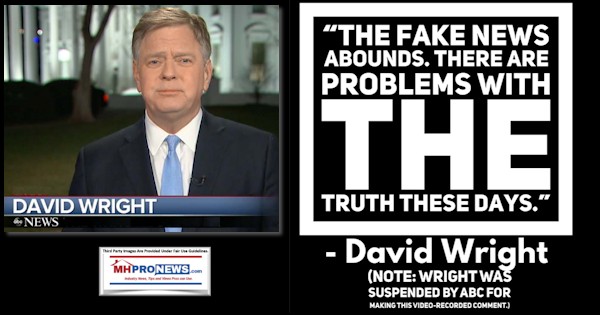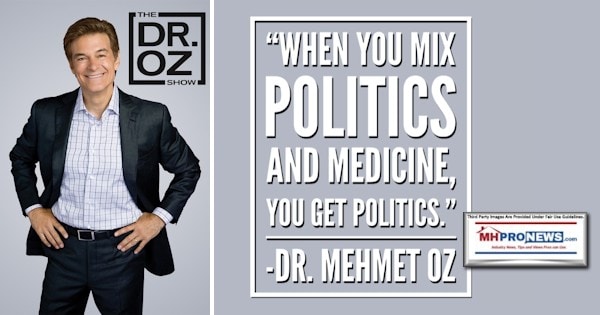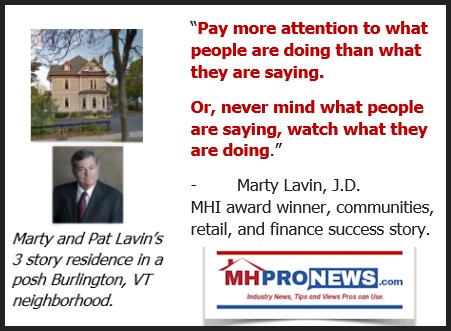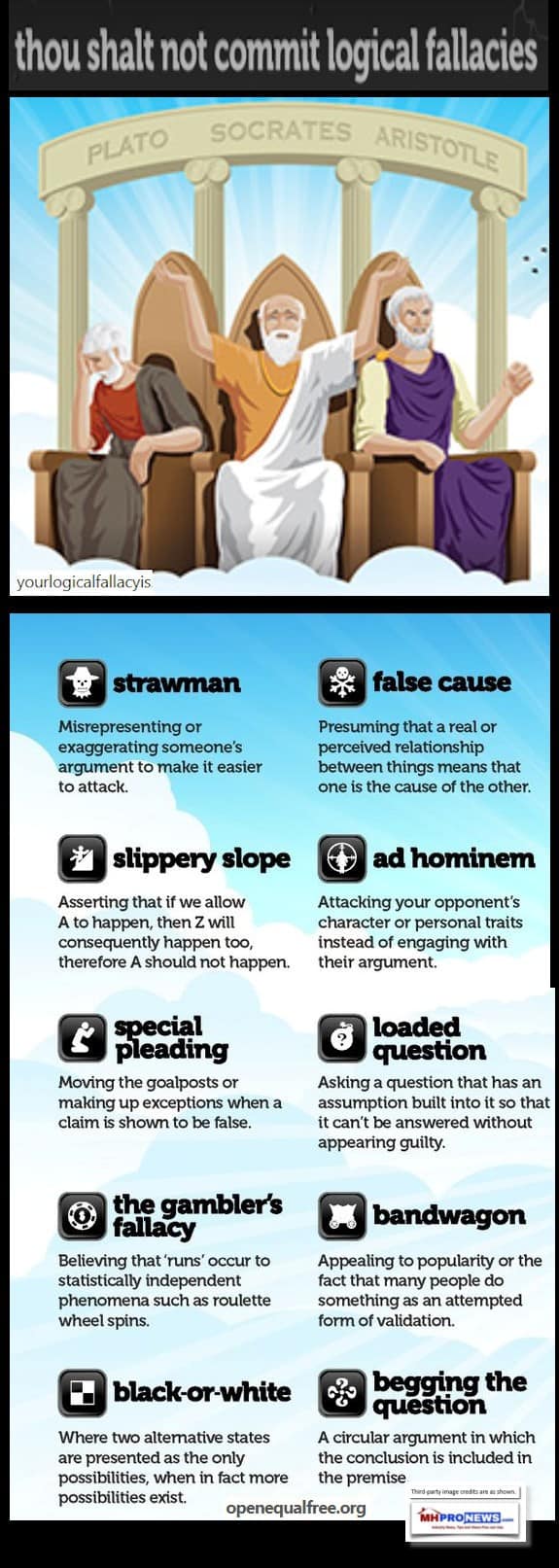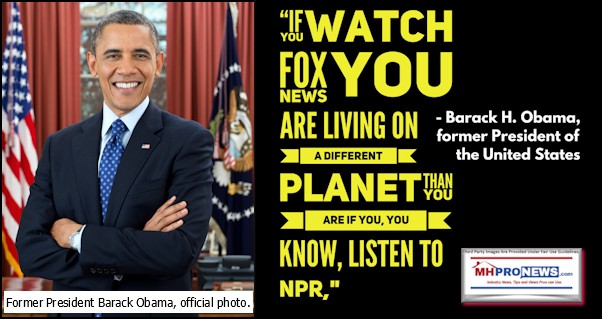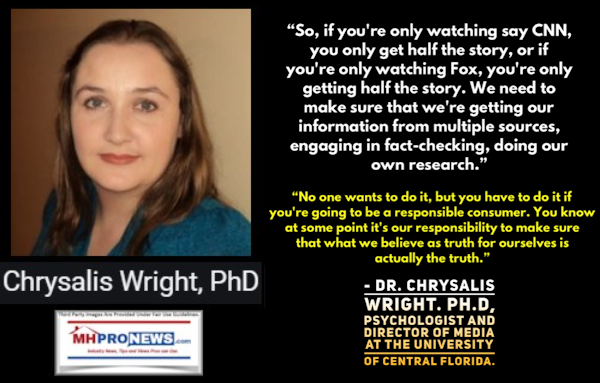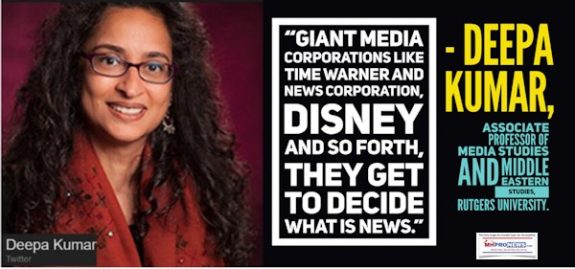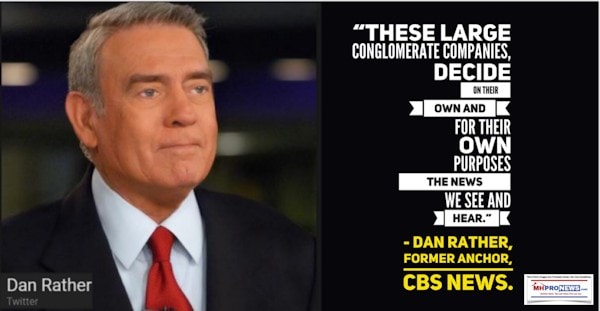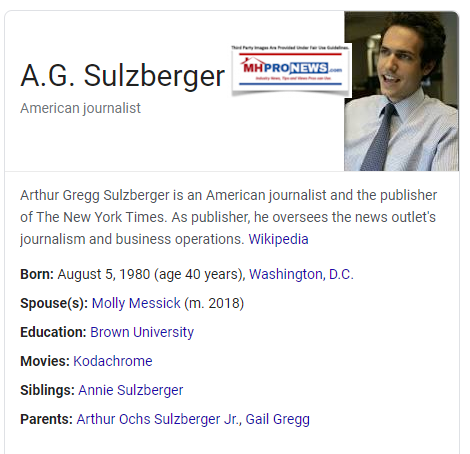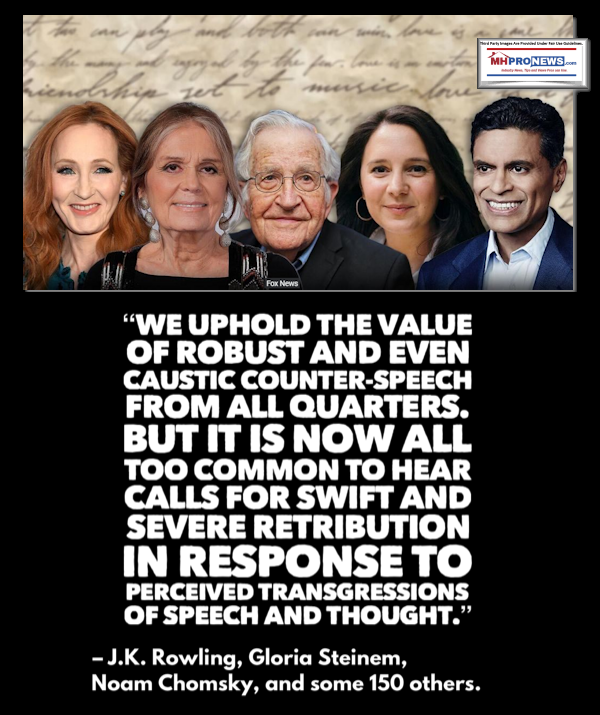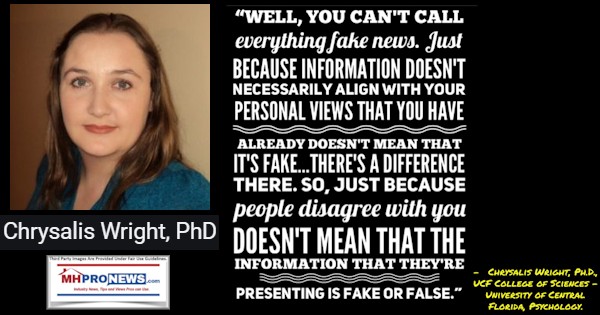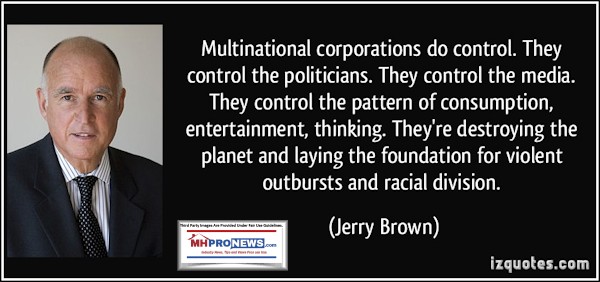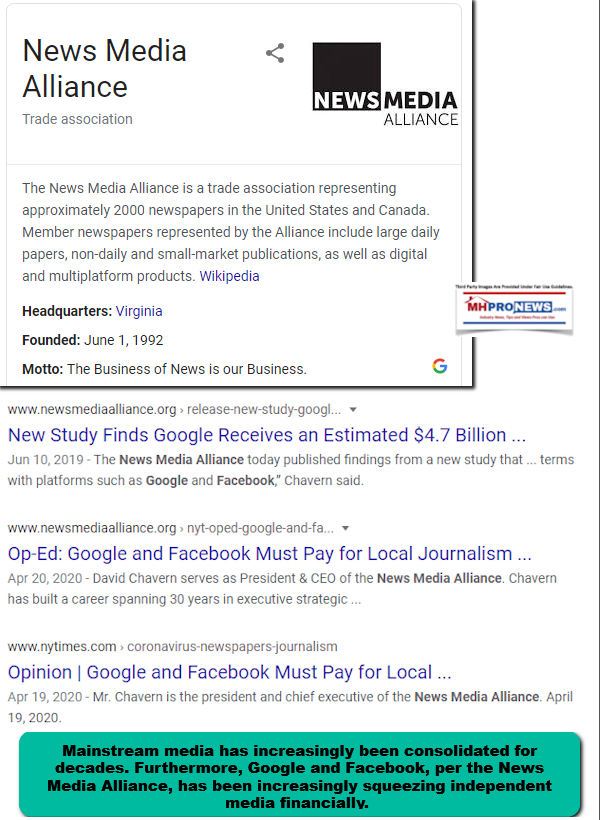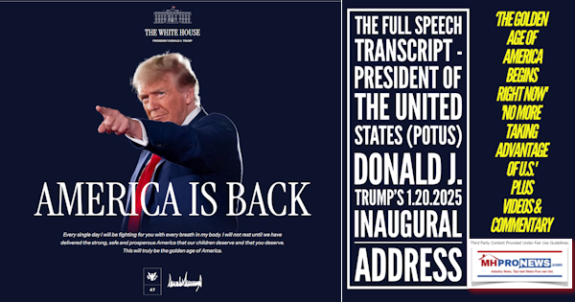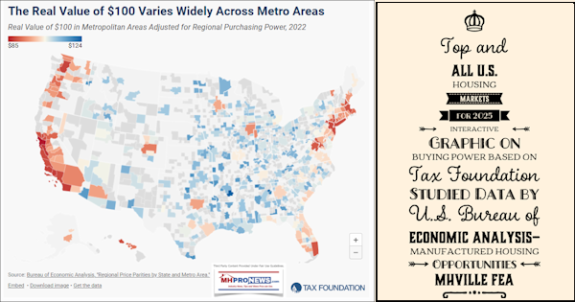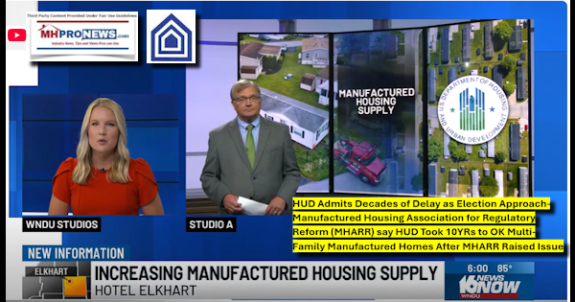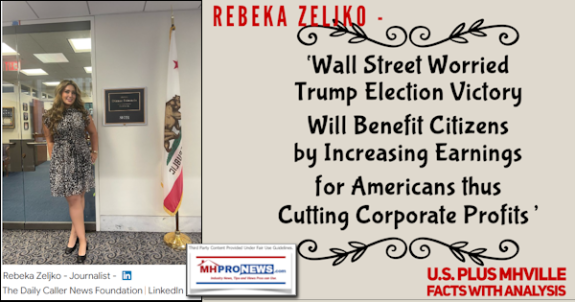Now-former MSNBC Producer Ariana Pekary publicly posted her reasons for quitting the left-of-center network in the latest mainstream media message on the sad state of the American news media – “…Why I’m Now Leaving MSNBC.” Subsequent to that, Pekary posted her reaction to right-of-center Fox News’ coverage of her resignation message, saying they have proven her point that it is the industry’s business model that is flawed, not just MSNBC, in her – “Follow Up A Note About Ideology.”
From her follow up on the topic of modern media is this gem, “My concerns are economic. The flawed structure of the [news] industry affects everyone. And that means everyone – red state, blue state, purple, whatever. My goal is to work to create a fair arena for discussion, debate, and reliable information. Thoughtful, independent voices should be promoted. I firmly believe that our democracy will not succeed otherwise.”
MHProNews will post both of her messages below as well as other relevant recent quotes that illustrate the low ebb that the mainstream news has sunk to per those in the profession. That should arguably include our profession’s trade media and bloggers too. To his credit, at least trade publisher Kurt Kelley replied and publicly said they don’t critique or attempt to hold the Manufactured Housing Institute (MHI), and by implication, their supporters to account.
Earlier this year, ABC news reporter David Wright made the following statement earlier this year per an undercover video captured by controversial Project Veritas. The quote frames the issue.
The two posts from former MSNBC producer Pekary will be provided unedited, provided under fair use guidelines for media. That will be followed by a brief MHProNews Analysis and Commentary, which in turn will be followed up by similar yet distinctive exit statement posted comments by former New York Times Editor Bari Weiss. Weiss also ripped her former publisher recently. This report will then include the letter published by 150 journalists, writers, educators, politicos, and others that include JK Rowling, Noam Chomsky, Gloria Steinem, and others. This will then conclude with additional information, quotes, MHProNews Analysis and Summarized Commentary.
Pekary’s comments merited inclusion in our periodic look at the challenges associated with discerning mainstream news. She cites a colleague who said “I was in your shoes when I was younger but I stuck it out.” Rephrased, this isn’t just a phenomenon from the Trump era. There are more that feel as Pekary does.
Pekary goes on to emphasize that point with this purported quotation. “We are a cancer and there is no cure,” a successful and insightful TV veteran said to me. “But if you could find a cure, it would change the world.”
MHProNews has for some years referenced the 2014 docudrama Shadows of Liberty. While they used voices primarily from left-of-center media, they gave specific instances of news stories that had been morphed or shelved due to political, economic, or other interests other than that of straight investigative reporting.
Said Pekary, mainstream networks businesses model does the following. “The model blocks diversity of thought and content because the networks have incentive to amplify fringe voices and events, at the expense of others… all because it pumps up the ratings.”
“Any discussion about the election usually focuses on Donald Trump, not Joe Biden, a repeat offense from 2016 (Trump smothers out all other coverage).” That’s demonstrably accurate, as pro-Democratic media outlets ignore wide swatches of Biden’s history that connect him to purported racism, allegations of sexual improprieties including an alleged assault, or to credible claims of corruption in public office that has enriched members of his family.
But it is the politicization of health and coronavirus related issues too, as she said: “As new details have become available about antibodies, a vaccine, or how COVID actually spreads, producers still want to focus on the politics. Important facts or studies get buried.” MHProNews has illustrated this point with this quotation from Dr. Mehemet Oz.
One of the more important gems she shared was this harsh blast. “Context and factual data are often considered too cumbersome for the audience. There may be some truth to that (our education system really should improve the critical thinking skills of Americans) – but another hard truth is that it is the job of journalists to teach and inform, which means they might need to figure out a better way to do that. They could contemplate more creative methods for captivating an audience.”
MHProNews frankly admits that our approach – like others in media – is imperfect too, but this platform has attempted to address the very notion that Pekary mentions. We do so by weaving in ‘straight news’ with clearly labeled commentary/analysis, explaining the use of logic and evidenced-based reasoning. It is ex-CBS News award winning journalist Sharyl Attkisson who some years ago spotlighted the problems of “fake news” and gave tips for discerning news consumers to use to discern the truth. Attkisson said that following the money trail – when relevant – and checking claimed facts from across the left/right media divide are important. Attkisson also produced the left-right media divide tool linked here to make news readers more discerning.
Attkisson’s thoughts find an echo in Manufactured Housing Institute (MHI) award winner Marty Lavin who has said similarly.
The quotes from industry professional Marty Lavin to MHProNews all share this commonality. Someone’s statements or so-called news can’t be swallowed at face value. It bears discernment, including, but not limited to, how prior statements or actions line up over time.
Some years ago, we began the process of informing thoughtful readers about logical fallacies and verbal slight-of-hands with illustrations like this one.
More recently, this platform occasionally illustrates the following infographic that explains more specifically the relevant process for discerning truth from fallacy, citing the source for each tactic.
With those predicates, here is now-former MSNBC Producer Ariana Pekary’s two posts earlier this week.

Personal news: why I’m now leaving MSNBC
ARIANA N. PEKARY 8.3.2020
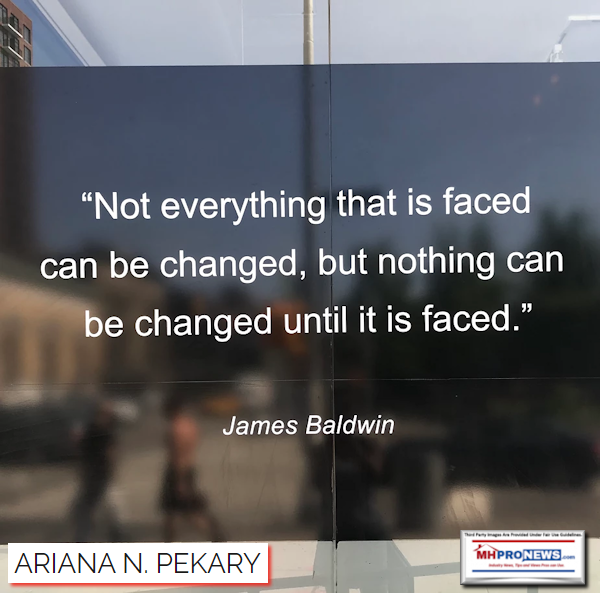
“Just quit.”
That’s the advice Alec gave a year and a half ago when I expressed concerns about my job.
“You just quit. It’s that simple.”
“Stay at MSNBC at least until the midterms,” Jeffrey said a couple years back. He advised to watch and see what happens.
“Hang in there… you’re needed,” Elizabeth recommended last winter. “I was in your shoes when I was younger but I stuck it out.”
A year and a half ago, simply quitting my job without knowing my next step sounded pretty radical. So I stuck it out a bit longer until we were in the middle of a pandemic to make a truly radical move.
July 24th was my last day at MSNBC. I don’t know what I’m going to do next exactly but I simply couldn’t stay there anymore. My colleagues are very smart people with good intentions. The problem is the job itself. It forces skilled journalists to make bad decisions on a daily basis.
You may not watch MSNBC but just know that this problem still affects you, too. All the commercial networks function the same – and no doubt that content seeps into your social media feed, one way or the other.
It’s possible that I’m more sensitive to the editorial process due to my background in public radio, where no decision I ever witnessed was predicated on how a topic or guest would “rate.” The longer I was at MSNBC, the more I saw such choices — it’s practically baked in to the editorial process – and those decisions affect news content every day. Likewise, it’s taboo to discuss how the ratings scheme distorts content, or it’s simply taken for granted, because everyone in the commercial broadcast news industry is doing the exact same thing.
But behind closed doors, industry leaders will admit the damage that’s being done.
“We are a cancer and there is no cure,” a successful and insightful TV veteran said to me. “But if you could find a cure, it would change the world.”
As it is, this cancer stokes national division, even in the middle of a civil rights crisis. The model blocks diversity of thought and content because the networks have incentive to amplify fringe voices and events, at the expense of others… all because it pumps up the ratings.
This cancer risks human lives, even in the middle of a pandemic. The primary focus quickly became what Donald Trump was doing (poorly) to address the crisis, rather than the science itself. As new details have become available about antibodies, a vaccine, or how COVID actually spreads, producers still want to focus on the politics. Important facts or studies get buried.
This cancer risks our democracy, even in the middle of a presidential election. Any discussion about the election usually focuses on Donald Trump, not Joe Biden, a repeat offense from 2016 (Trump smothers out all other coverage). Also important is to ensure citizens can vote by mail this year, but I’ve watched that topic get ignored or “killed” numerous times.
Context and factual data are often considered too cumbersome for the audience. There may be some truth to that (our education system really should improve the critical thinking skills of Americans) – but another hard truth is that it is the job of journalists to teach and inform, which means they might need to figure out a better way to do that. They could contemplate more creative methods for captivating an audience. Just about anything would improve the current process, which can be pretty rudimentary (think basing today’s content on whatever rated well yesterday, or look to see what’s trending online today).
Occasionally, the producers will choose to do a topic or story without regard for how they think it will rate, but that is the exception, not the rule. Due to the simple structure of the industry – the desire to charge more money for commercials, as well as the ratings bonuses that top-tier decision-makers earn – they always relapse into their old profitable programming habits.
I understand that the journalistic process is largely subjective and any group of individuals may justify a different set of priorities on any given day. Therefore, it’s particularly notable to me, for one, that nearly every rundown at the network basically is the same, hour after hour. And two, they use this subjective nature of the news to justify economically beneficial decisions. I’ve even heard producers deny their role as journalists. A very capable senior producer once said: “Our viewers don’t really consider us the news. They come to us for comfort.”
Again, personally, I don’t think the people need to change. I think the job itself needs to change. There is a better way to do this. I’m not so cynical to think that we are absolutely doomed (though we are on that path). I know we can find a cure. If we can figure how to send a man to the moon, if Alex Trebek can defy the odds with stage 4 pancreatic cancer, and if Harry Reid can actually overcome pancreatic cancer (he’s now cancer free), then we can fix this, too.
“Not everything that is faced can be changed, but nothing can be changed until it is faced.”
I know James Baldwin wasn’t thinking about MSNBC when he wrote that line in 1962, but those words spoke loudly to me in the summer of 2020. Unfortunately, many of the same ailments are still at stake today. Now maybe we can’t really change the inherently broken structure of broadcast news, but I know for certain that it won’t change unless we actually face it, in public, and at least try to change it.
Through this pandemic and the surreal, alienating lockdown, I’ve witnessed many people question their lives and what they’re doing with their time on this planet. I reckon I’m one of those people, looking for greater meaning and truth. As much as I love my life in New York City and really don’t want to leave, I feel fortunate to be able to return to Virginia in the near term to reconnect with family, friends, and a community of independent journalists. I’m both nervous and excited about this change. Thanks to COVID-19, I’m learning to live with uncertainty.
And so very soon, I’m going to be seeking you out, any one of you who also may sense that the news is fundamentally flawed and is frustrated by it. This effort will start informally but I hope to crystallize a plan for when better, safer days are upon us. On that front, feel free to reach out anytime if you would like to discuss any of this – whether in agreement or not. More than ever, I’m craving a full and civil discourse.
Until next time, thank you for reading. I wish you all well.
Ariana
##
That was followed two days later with this.
Follow up + a note about ideology
ARIANA N. PEKARY 8.5.2020

First: thank you everyone for your responses. I’m overwhelmed, surprised, and heartened by your reaction. Over the last couple of years, I was starting to think that people don’t care about the news (inside the industry or out), but you do care and that gives me enormous hope that change can and will happen. And there is no way I can do this by myself, so I welcome the moral support.
Second: I feel the need to say something about how Fox News reported my story yesterday. The reporter contacted me for an interview. To be honest, I wasn’t inclined to do an interview with Fox for all the reasons I outlined in the piece (I don’t know if I can trust them, because again, like MSNBC, their job is to rouse their audience). I hadn’t responded yet when they posted their story anyway.
As it turns out, Fox News inadvertently proved me right. My concern, clearly stated in the post, is with the entire industry because each outlet uses the same funding model. That includes Fox News, of course, but they couldn’t help but to turn my statement into a divisive piece of clickbait. The headline skewed the intention of my piece and they removed almost all of the context in which I explain the systemic nature of the problem. That is unfortunate, but not surprising.
I regret if my piece was presented as an attack on a single network, but that only gives me motivation to continue on this new path. It’s just another example of the division I’m trying to alleviate. My purpose isn’t to drive people away from the industry, but to raise awareness (as a first step). We all deserve better and we can do better.
Lastly on this point, I have to emphasize that my concerns are not ideological in nature. My concerns are economic. The flawed structure of the industry affects everyone. And that means everyone – red state, blue state, purple, whatever. My goal is to work to create a fair arena for discussion, debate, and reliable information. Thoughtful, independent voices should be promoted. I firmly believe that our democracy will not succeed otherwise.
Please keep sending your thoughts and reactions. There is so much more I have to share with you. I hope to have a plan very soon and I will let you know when that happens. You all are hungrier to address this problem than I thought.
Also please note: I am in the middle my move so I’m not yet able to respond to everyone but I will get to you. I apologize for the delay. It means a lot that you took the time to find me and to write so I will get back to you.
Thank you, all.
Ariana
##
MHProNews Analysis and Commentary in Brief
It was 2 ½ years ago that Sharyl Attkisson did this TEDx talk posted to YouTube on February 13, 2018.
Former President Barack Obama aptly described the issue of the serious divide between the left and right in mainstream media with this memorable quote.
We’ve shared the analysis by Professor Wright that to get a better sense of the news, it is necessary to access reports from both the left and the right wing sides of mainstream media.
But more than that, there are times when media on both sides of the left-right agenda aisles get a story wrong. That’s a point that the recommended docudrama Shadows of Liberty made. That video makes related points and cites specific examples, often from a left-0f-center perspective.
With that brief interlude, let’s pivot to the other two statements in July from media, publishing, politicos, and academics who have expressed their concerns that to various degrees echo and amplify what Pekary said. The following is from Bari Weiss, formerly with the New York Times editorial team.

Dear A.G.,
It is with sadness that I write to tell you that I am resigning from The New York Times.
I joined the paper with gratitude and optimism three years ago. I was hired with the goal of bringing in voices that would not otherwise appear in your pages: first-time writers, centrists, conservatives and others who would not naturally think of The Times as their home. The reason for this effort was clear: The paper’s failure to anticipate the outcome of the 2016 election meant that it didn’t have a firm grasp of the country it covers. Dean Baquet and others have admitted as much on various occasions. The priority in Opinion was to help redress that critical shortcoming.
I was honored to be part of that effort, led by James Bennet. I am proud of my work as a writer and as an editor. Among those I helped bring to our pages: the Venezuelan dissident Wuilly Arteaga; the Iranian chess champion Dorsa Derakhshani; and the Hong Kong Christian democrat Derek Lam. Also: Ayaan Hirsi Ali, Masih Alinejad, Zaina Arafat, Elna Baker, Rachael Denhollander, Matti Friedman, Nick Gillespie, Heather Heying, Randall Kennedy, Julius Krein, Monica Lewinsky, Glenn Loury, Jesse Singal, Ali Soufan, Chloe Valdary, Thomas Chatterton Williams, Wesley Yang, and many others.
But the lessons that ought to have followed the election—lessons about the importance of understanding other Americans, the necessity of resisting tribalism, and the centrality of the free exchange of ideas to a democratic society—have not been learned. Instead, a new consensus has emerged in the press, but perhaps especially at this paper: that truth isn’t a process of collective discovery, but an orthodoxy already known to an enlightened few whose job is to inform everyone else.
Twitter is not on the masthead of The New York Times. But Twitter has become its ultimate editor. As the ethics and mores of that platform have become those of the paper, the paper itself has increasingly become a kind of performance space. Stories are chosen and told in a way to satisfy the narrowest of audiences, rather than to allow a curious public to read about the world and then draw their own conclusions. I was always taught that journalists were charged with writing the first rough draft of history. Now, history itself is one more ephemeral thing molded to fit the needs of a predetermined narrative.
My own forays into Wrongthink have made me the subject of constant bullying by colleagues who disagree with my views. They have called me a Nazi and a racist; I have learned to brush off comments about how I’m “writing about the Jews again.” Several colleagues perceived to be friendly with me were badgered by coworkers. My work and my character are openly demeaned on company-wide Slack channels where masthead editors regularly weigh in. There, some coworkers insist I need to be rooted out if this company is to be a truly “inclusive” one, while others post ax emojis next to my name. Still other New York Times employees publicly smear me as a liar and a bigot on Twitter with no fear that harassing me will be met with appropriate action. They never are.
There are terms for all of this: unlawful discrimination, hostile work environment, and constructive discharge. I’m no legal expert. But I know that this is wrong.
I do not understand how you have allowed this kind of behavior to go on inside your company in full view of the paper’s entire staff and the public. And I certainly can’t square how you and other Times leaders have stood by while simultaneously praising me in private for my courage. Showing up for work as a centrist at an American newspaper should not require bravery.
Part of me wishes I could say that my experience was unique. But the truth is that intellectual curiosity—let alone risk-taking—is now a liability at The Times. Why edit something challenging to our readers, or write something bold only to go through the numbing process of making it ideologically kosher, when we can assure ourselves of job security (and clicks) by publishing our 4000th op-ed arguing that Donald Trump is a unique danger to the country and the world? And so self-censorship has become the norm.
What rules that remain at The Times are applied with extreme selectivity. If a person’s ideology is in keeping with the new orthodoxy, they and their work remain unscrutinized. Everyone else lives in fear of the digital thunderdome. Online venom is excused so long as it is directed at the proper targets.
Op-eds that would have easily been published just two years ago would now get an editor or a writer in serious trouble, if not fired. If a piece is perceived as likely to inspire backlash internally or on social media, the editor or writer avoids pitching it. If she feels strongly enough to suggest it, she is quickly steered to safer ground. And if, every now and then, she succeeds in getting a piece published that does not explicitly promote progressive causes, it happens only after every line is carefully massaged, negotiated and caveated.
It took the paper two days and two jobs to say that the Tom Cotton op-ed “fell short of our standards.” We attached an editor’s note on a travel story about Jaffa shortly after it was published because it “failed to touch on important aspects of Jaffa’s makeup and its history.” But there is still none appended to Cheryl Strayed’s fawning interview with the writer Alice Walker, a proud anti-Semite who believes in lizard Illuminati.
The paper of record is, more and more, the record of those living in a distant galaxy, one whose concerns are profoundly removed from the lives of most people. This is a galaxy in which, to choose just a few recent examples, the Soviet space program is lauded for its “diversity”; the doxxing of teenagers in the name of justice is condoned; and the worst caste systems in human history includes the United States alongside Nazi Germany.
Even now, I am confident that most people at The Times do not hold these views. Yet they are cowed by those who do. Why? Perhaps because they believe the ultimate goal is righteous. Perhaps because they believe that they will be granted protection if they nod along as the coin of our realm—language—is degraded in service to an ever-shifting laundry list of right causes. Perhaps because there are millions of unemployed people in this country and they feel lucky to have a job in a contracting industry.
Or perhaps it is because they know that, nowadays, standing up for principle at the paper does not win plaudits. It puts a target on your back. Too wise to post on Slack, they write to me privately about the “new McCarthyism” that has taken root at the paper of record.
All this bodes ill, especially for independent-minded young writers and editors paying close attention to what they’ll have to do to advance in their careers. Rule One: Speak your mind at your own peril. Rule Two: Never risk commissioning a story that goes against the narrative. Rule Three: Never believe an editor or publisher who urges you to go against the grain. Eventually, the publisher will cave to the mob, the editor will get fired or reassigned, and you’ll be hung out to dry.
For these young writers and editors, there is one consolation. As places like The Times and other once-great journalistic institutions betray their standards and lose sight of their principles, Americans still hunger for news that is accurate, opinions that are vital, and debate that is sincere. I hear from these people every day. “An independent press is not a liberal ideal or a progressive ideal or a democratic ideal. It’s an American ideal,” you said a few years ago. I couldn’t agree more. America is a great country that deserves a great newspaper.
None of this means that some of the most talented journalists in the world don’t still labor for this newspaper. They do, which is what makes the illiberal environment especially heartbreaking. I will be, as ever, a dedicated reader of their work. But I can no longer do the work that you brought me here to do—the work that Adolph Ochs described in that famous 1896 statement: “to make of the columns of The New York Times a forum for the consideration of all questions of public importance, and to that end to invite intelligent discussion from all shades of opinion.”
Ochs’s idea is one of the best I’ve encountered. And I’ve always comforted myself with the notion that the best ideas win out. But ideas cannot win on their own. They need a voice. They need a hearing. Above all, they must be backed by people willing to live by them.
Sincerely,
Bari
##
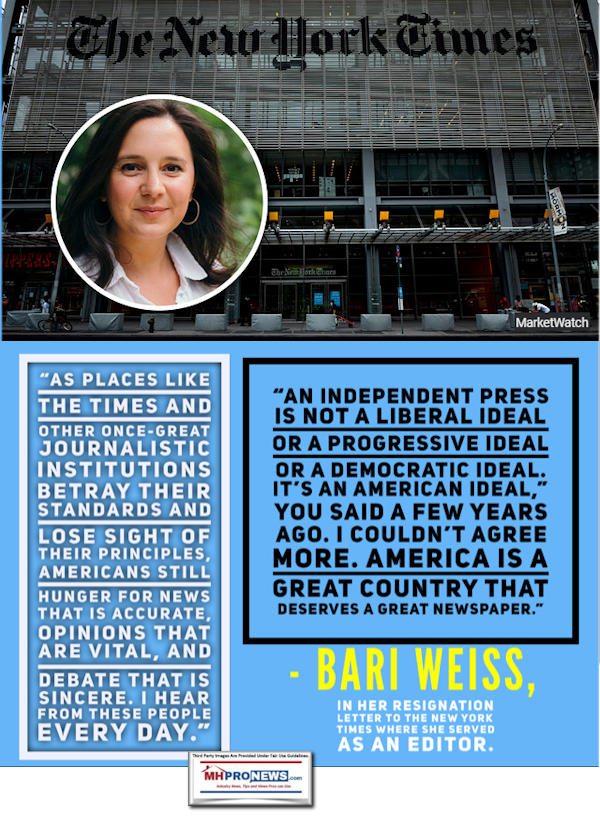

A Letter on Justice and Open Debate
July 7, 2020
The below letter will be appearing in the Letters section of the magazine’s October issue.
Our cultural institutions are facing a moment of trial. Powerful protests for racial and social justice are leading to overdue demands for police reform, along with wider calls for greater equality and inclusion across our society, not least in higher education, journalism, philanthropy, and the arts. But this needed reckoning has also intensified a new set of moral attitudes and political commitments that tend to weaken our norms of open debate and toleration of differences in favor of ideological conformity. As we applaud the first development, we also raise our voices against the second. The forces of illiberalism are gaining strength throughout the world and have a powerful ally in Donald Trump, who represents a real threat to democracy. But resistance must not be allowed to harden into its own brand of dogma or coercion—which right-wing demagogues are already exploiting. The democratic inclusion we want can be achieved only if we speak out against the intolerant climate that has set in on all sides.
The free exchange of information and ideas, the lifeblood of a liberal society, is daily becoming more constricted. While we have come to expect this on the radical right, censoriousness is also spreading more widely in our culture: an intolerance of opposing views, a vogue for public shaming and ostracism, and the tendency to dissolve complex policy issues in a blinding moral certainty. We uphold the value of robust and even caustic counter-speech from all quarters. But it is now all too common to hear calls for swift and severe retribution in response to perceived transgressions of speech and thought. More troubling still, institutional leaders, in a spirit of panicked damage control, are delivering hasty and disproportionate punishments instead of considered reforms. Editors are fired for running controversial pieces; books are withdrawn for alleged inauthenticity; journalists are barred from writing on certain topics; professors are investigated for quoting works of literature in class; a researcher is fired for circulating a peer-reviewed academic study; and the heads of organizations are ousted for what are sometimes just clumsy mistakes. Whatever the arguments around each particular incident, the result has been to steadily narrow the boundaries of what can be said without the threat of reprisal. We are already paying the price in greater risk aversion among writers, artists, and journalists who fear for their livelihoods if they depart from the consensus, or even lack sufficient zeal in agreement.
This stifling atmosphere will ultimately harm the most vital causes of our time. The restriction of debate, whether by a repressive government or an intolerant society, invariably hurts those who lack power and makes everyone less capable of democratic participation. The way to defeat bad ideas is by exposure, argument, and persuasion, not by trying to silence or wish them away. We refuse any false choice between justice and freedom, which cannot exist without each other. As writers we need a culture that leaves us room for experimentation, risk taking, and even mistakes. We need to preserve the possibility of good-faith disagreement without dire professional consequences. If we won’t defend the very thing on which our work depends, we shouldn’t expect the public or the state to defend it for us.
Elliot Ackerman
Saladin Ambar, Rutgers University
Martin Amis
Anne Applebaum
Marie Arana, author
Margaret Atwood
John Banville
Mia Bay, historian
Louis Begley, writer
Roger Berkowitz, Bard College
Paul Berman, writer
Sheri Berman, Barnard College
Reginald Dwayne Betts, poet
Neil Blair, agent
David W. Blight, Yale University
Jennifer Finney Boylan, author
David Bromwich
David Brooks, columnist
Ian Buruma, Bard College
Lea Carpenter
Noam Chomsky, MIT (emeritus)
Nicholas A. Christakis, Yale University
Roger Cohen, writer
Ambassador Frances D. Cook, ret.
Drucilla Cornell, Founder, uBuntu Project
Kamel Daoud
Meghan Daum, writer
Gerald Early, Washington University-St. Louis
Jeffrey Eugenides, writer
Dexter Filkins
Federico Finchelstein, The New School
Caitlin Flanagan
Richard T. Ford, Stanford Law School
Kmele Foster
David Frum, journalist
Francis Fukuyama, Stanford University
Atul Gawande, Harvard University
Todd Gitlin, Columbia University
Kim Ghattas
Malcolm Gladwell
Michelle Goldberg, columnist
Rebecca Goldstein, writer
Anthony Grafton, Princeton University
David Greenberg, Rutgers University
Linda Greenhouse
Rinne B. Groff, playwright
Sarah Haider, activist
Jonathan Haidt, NYU-Stern
Roya Hakakian, writer
Shadi Hamid, Brookings Institution
Jeet Heer, The Nation
Katie Herzog, podcast host
Susannah Heschel, Dartmouth College
Adam Hochschild, author
Arlie Russell Hochschild, author
Eva Hoffman, writer
Coleman Hughes, writer/Manhattan Institute
Hussein Ibish, Arab Gulf States Institute
Michael Ignatieff
Zaid Jilani, journalist
Bill T. Jones, New York Live Arts
Wendy Kaminer, writer
Matthew Karp, Princeton University
Garry Kasparov, Renew Democracy Initiative
Daniel Kehlmann, writer
Randall Kennedy
Khaled Khalifa, writer
Parag Khanna, author
Laura Kipnis, Northwestern University
Frances Kissling, Center for Health, Ethics, Social Policy
Enrique Krauze, historian
Anthony Kronman, Yale University
Joy Ladin, Yeshiva University
Nicholas Lemann, Columbia University
Mark Lilla, Columbia University
Susie Linfield, New York University
Damon Linker, writer
Dahlia Lithwick, Slate
Steven Lukes, New York University
John R. MacArthur, publisher, writer
Susan Madrak, writer
Phoebe Maltz Bovy, writer
Greil Marcus
Wynton Marsalis, Jazz at Lincoln Center
Kati Marton, author
Debra Mashek, scholar
Deirdre McCloskey, University of Illinois at Chicago
John McWhorter, Columbia University
Uday Mehta, City University of New York
Andrew Moravcsik, Princeton University
Yascha Mounk, Persuasion
Samuel Moyn, Yale University
Meera Nanda, writer and teacher
Cary Nelson, University of Illinois at Urbana-Champaign
Olivia Nuzzi, New York Magazine
Mark Oppenheimer, Yale University
Dael Orlandersmith, writer/performer
George Packer
Nell Irvin Painter, Princeton University (emerita)
Greg Pardlo, Rutgers University – Camden
Orlando Patterson, Harvard University
Steven Pinker, Harvard University
Letty Cottin Pogrebin
Katha Pollitt, writer
Claire Bond Potter, The New School
Taufiq Rahim
Zia Haider Rahman, writer
Jennifer Ratner-Rosenhagen, University of Wisconsin
Jonathan Rauch, Brookings Institution/The Atlantic
Neil Roberts, political theorist
Melvin Rogers, Brown University
Kat Rosenfield, writer
Loretta J. Ross, Smith College
J.K. Rowling
Salman Rushdie, New York University
Karim Sadjadpour, Carnegie Endowment
Daryl Michael Scott, Howard University
Diana Senechal, teacher and writer
Jennifer Senior, columnist
Judith Shulevitz, writer
Jesse Singal, journalist
Anne-Marie Slaughter
Andrew Solomon, writer
Deborah Solomon, critic and biographer
Allison Stanger, Middlebury College
Paul Starr, American Prospect/Princeton University
Wendell Steavenson, writer
Gloria Steinem, writer and activist
Nadine Strossen, New York Law School
Ronald S. Sullivan Jr., Harvard Law School
Kian Tajbakhsh, Columbia University
Zephyr Teachout, Fordham University
Cynthia Tucker, University of South Alabama
Adaner Usmani, Harvard University
Chloe Valdary
Helen Vendler, Harvard University
Judy B. Walzer
Michael Walzer
Eric K. Washington, historian
Caroline Weber, historian
Randi Weingarten, American Federation of Teachers
Bari Weiss
Sean Wilentz, Princeton University
Garry Wills
Thomas Chatterton Williams, writer
Robert F. Worth, journalist and author
Molly Worthen, University of North Carolina at Chapel Hill
Matthew Yglesias
Emily Yoffe, journalist
Cathy Young, journalist
Fareed Zakaria
Institutions are listed for identification purposes only.
##
MHProNews Additional Analysis and Closing Summary
With an ever-increasing array of third-party research, public polling, and such exposes by those involved in media, it begs the question Pekary and others raise. How can this “cancer” of agenda-driven, click bait, spin, and ‘fake news’ be addressed?
A key part of the answer may be surprisingly simple. Much of the problem, when carefully examined, is the consolidation of mainstream media and tech-platforms like Google, Facebook, or Twitter could be reduced to an argument for robust antitrust action.
It is often among the richest companies and their famous billionaire connections that own and shape the news in their desired image.
Not everything is fake news. Not everything is click bait or weaponized. But as our industry has revealed to longtime readers of this pro-industry for professionals media platform has made clear for years, people pay for ‘news’ that fits their agenda.
Local anchors may make some $40,000 to $60,000, per some quick Google search results. By contrast, the top news anchors on cable or network news can make tens of millions of dollars a year. Is the difference talent? Or is the difference the willingness of those on camera to promote a specific narrative?
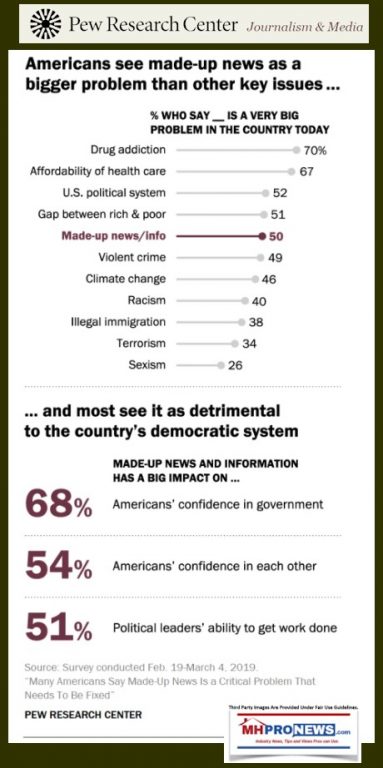


The News Media Alliance has pointed to the financial squeeze that Google and Facebook have placed on mainstream media. Rephrased, there are a variety of pressures on the news industry. The numbers of journalists have been steadily declining as consolidation increases.
Follow the money trail in the media industry and beyond, and some interesting insights emerge.
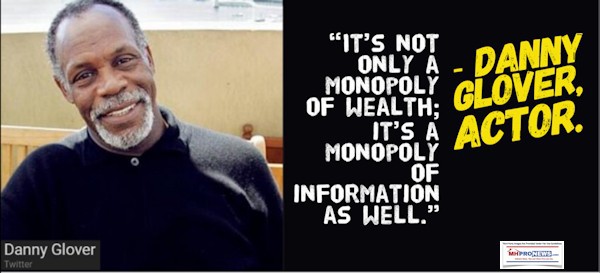
[cp_popup display=”inline” style_id=”139941″ step_id = “1”][/cp_popup]

There is a battle for what is or isn’t true and click-bait, confirmation bias, agenda driven media makes that more difficult for millions. There are reasons to think that on some issues at least, Ariana Pekary and this platform would see several issues differently. But on the notion that mainstream media is problematic at best, we’d broadly concur. It was with those concerns that reports like this or the one below was published.
There is always more to come, so stay tuned with the runaway number one source for authentic “News through the lens of manufactured homes and factory-built housing” © where “We Provide, You Decide.” © ## (Affordable housing, manufactured homes, reports, fact-checks, analysis, and commentary. Third-party images or content are provided under fair use guidelines for media.) (See Related Reports, further below. Text/image boxes often are hot-linked to other reports that can be access by clicking on them.)

By L.A. “Tony” Kovach – for MHProNews.com.
Tony earned a journalism scholarship and earned numerous awards in history and in manufactured housing.
For example, he earned the prestigious Lottinville Award in history from the University of Oklahoma, where he studied history and business management. He’s a managing member and co-founder of LifeStyle Factory Homes, LLC, the parent company to MHProNews, and MHLivingNews.com.
This article reflects the LLC’s and/or the writer’s position, and may or may not reflect the views of sponsors or supporters.
Connect on LinkedIn: http://www.linkedin.com/in/latonykovach
Related References:
The text/image boxes below are linked to other reports, which can be accessed by clicking on them.
Skyline Champion President, CEO Mark Yost & Manufactured Housing Institute CEO Lesli Gooch, Ph.D, in White House Photo Op Featuring President Trump and VP Pence
In an emailed statement, “[Manufactured Housing Institute] has published enough razzle- the past 3 years to wallpaper an entire house and have some leftover.” So said an association connected source in response to the Arlington, VA based trade group MHI, which touted for their readers their latest photo opportunity at a White House deregulatory event featuring President Donald Trump and Vice President Mike Pence.
Fear & Frustration – Constitutionality of Business, Religious Shutdowns, Other Restrictions Challenged, plus Sunday Headlines Review 6.28 to 7.5.2020
For two months running, job creation – or recreation – has outpaced expectations. The hope of a so-called V shaped recovery have been growing. But has media across the left-right media divide have reported, the numbers of newly reported daily cases of COVID19 has surged past 55,000, according to the l eft-of-center NPR.
Complaints to State and Federal Officials, Agencies About Corrupt Practices in Manufactured Housing Industry Growing
Manufactured Home Professional News ( MHProNews) has recently been provided evidence of several complaints to state and federal officials and agencies of purportedly corrupt and illegal practices in manufactured housing. The sources for that statement includes residents, professionals and public officials.

 https://www.manufacturedhomepronews.com/masthead/american-dream-rigged-system-vs-positive-thinking-success-books-seminars-and-videos/
https://www.manufacturedhomepronews.com/masthead/american-dream-rigged-system-vs-positive-thinking-success-books-seminars-and-videos/

Kevin Clayton, CEO Clayton Homes, Explains Why Replacing Sales Professionals with Automation Makes Sense
” Our greatest assets are our team members, and we are committed to continually improving their lives. Whether investing in leadership initiatives, or improving our facilities, we believe the only way you can create a world-class customer experience is by first creating a world-class team member experience .”
Epic! Creating 200,000 New MH Homesites in 4 Years; Allegations of Corruption by Fannie, Freddie, Others in Duty to Serve Manufactured Housing Law
The word “historic” or “epic” can often mean “inspiring” in specific contexts. The historically tough resolve of those who died defending a monastery against Mexican invaders became the battle cry ” Remember the Alamo” that led to Sam Houston’s upset victory against Santa Anna’s force that had double the numbers of the Texan soldiers.
In Manufactured Housing’s COVID19 War, MHARR Wins A Battle – Retailers, Installers & Transporters Alert
Governor Andrew Cuomo (NY-D) and President Donald J. Trump (GOP) are among those who have called the fight against the Wuhan Virus a war against an invisible enemy. While the metaphor fits in some ways, an argument can be made that the enemies in this war are both visible and invisible.



